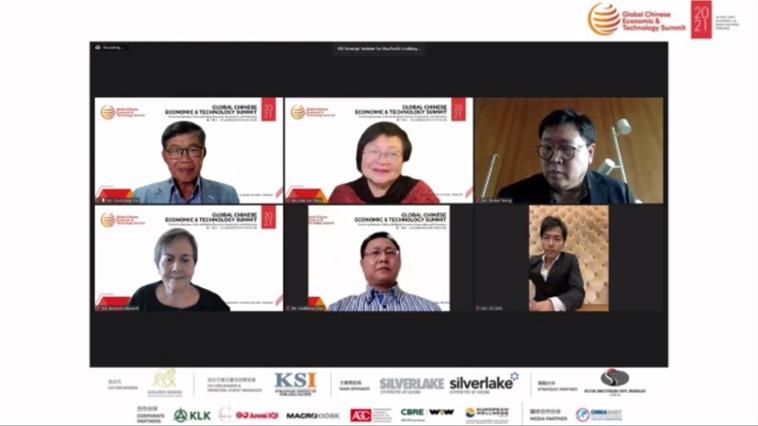 Panelists discuss how business can embrace new opportunities in new growth areas at the Global Chinese Economic and Technology Summit on Dec 16, 2021. (SCREENSHOT VIA ZOOM)
Panelists discuss how business can embrace new opportunities in new growth areas at the Global Chinese Economic and Technology Summit on Dec 16, 2021. (SCREENSHOT VIA ZOOM)
As businesses embrace new opportunities in an increasingly digitalized world, China, with strong technology strengths and a huge market, can be the new area for growth, a summit heard on Dec 16.
New business trends, from disruptive innovations in technologies to health tech and sustainability, will take priority in the world economy today and will continue to open new business opportunities in the year to come, said Guna Mahalingam, founder and CEO of Strategic Swiss Partners, a boutique management and financial advisory firm in Zurich.
New business trends, from disruptive innovations in technologies to health tech and sustainability, will take priority in the world economy today and will continue to open new business opportunities in the year to come, said Guna Mahalingam, founder and CEO of Strategic Swiss Partners
Mahalingam was speaking at the 2021 Global Chinese Economic and Technology Summit held in Penang, Malaysia.
Under the theme "Promote Business, Cultural and Digital Economy Cooperation and Diplomacy", the summit, held both offline and online, brought together government officials, business leaders and academics from 45 countries. It was co-organized by KSI Strategic Institute for Asia Pacific, a think tank in Kuala Lumpur. China Daily was a media partner at the event.
ALSO READ: Industrial IoT to boost global ties
"China is estimated to be the largest consumer economy today and the new growth area," said Mahalingam, adding that the country may lead new consumption in the world over the next decade and is a market that many global investors are looking into.
Although China was not a key leader in technology and innovation 10 or 20 years ago, the country has now done better than any other economy globally in terms of newly emerged large-scale companies and newly minted billionaires, said Xiang Bing, founding dean and professor of China business and globalization at Cheung Kong Graduate School of Business, or CKGSB, in Beijing.
The number of China-based companies listed on the Fortune Global 500 surpassed that of the United States for the first time in 2020, with 124 companies based on the Chinese mainland and in Hong Kong, as well as 9 in Taiwan. There were no Chinese companies on the list when the Global 500 ranking first came out in 1990.
Xiang said he believes the future of the Chinese economy will be very bright as the country still has many sectors that need to be deregulated, which will help drive its growth.
Drawing from its experience, China has recognized the importance of providing young people a better chance of moving up in the society, Xiang said. In this regard, CKGSB is partnering with the United Nations Educational, Scientific and Cultural Organization, or UNESCO, to help cultivate digital talent in Africa and generate unicorn companies – privately held startups valued at $1 billion or more.
ALSO READ: Clearing technology bottlenecks to promote innovation
Xiang said the project will move to Japan and South Korea in 2022 and he hopes it can be expanded to other regions including Southeast Asia, Latin America and the Middle East.
Chin Yew Sin, adviser for Asia-Pacific region at the Global One Belt One Road Association, said that as China is a world leader in digital technology, members of the Association of Southeast Asian Nations can cooperate with China to develop their technologies faster.
 Panelists discuss key trends of digital technology and digital economy at the Global Chinese Economic and Technology Summit on Dec 16, 2021. (SCREENSHOT VIA ZOOM)
Panelists discuss key trends of digital technology and digital economy at the Global Chinese Economic and Technology Summit on Dec 16, 2021. (SCREENSHOT VIA ZOOM)
Noting green technology is vital to tackle climate change, Chin said there are two industries wherein he sees rising opportunities – solar power and electric vehicles.
While China's Belt and Road Initiative has helped many regional countries to develop their physical infrastructure, Chin said he believes the digital Silk Road – a BRI component focused on improving global digital infrastructure – will help promote technological cooperation between regional countries and China.
Henry Goh, co-founder and group chief operating officer of digital technology company Macrokiosk in Malaysia, said that as manufacturing technology can help support the real economy, he sees an opportunity for Chinese companies to expand outside to countries such as Malaysia, which will bring real wealth and market access.
ALSO READ: China-ASEAN technology forum to be held in south China
"China is embracing environmental sustainability. I think it is a key area that they are trying to transform themselves … they have learned a lot from that area in terms of manufacturing and there is something they can share with countries around the region," said Goh.
Noting the net-zero greenhouse gas emissions target has become the most critical issue for mankind, Barbara Meynert, senior adviser of supply chain solutions firm Fung Group, said that while digital technologies will be needed to achieve the goal, the digitalization of green finance will also be important.
"China alone declared they will need close to 100 trillion yuan ($15.56 trillion) to green the economy to reach the net-zero target, and when you add that up it is going to be hundreds and hundreds of trillions worldwide," said Meynert, noting the important role of technology, particularly in terms of how to digitalize green finance and make it work.
Chu Jenn Weng, managing director, president and CEO of Malaysian electronics company ViTrox Corporation, said there are many great agritech companies from China, such as DJI and FJ Dynamics, which have successfully transformed the country's agriculture landscape.
READ MORE: Integrated approach vital to Asia prosperity
"I believe we, from Malaysia and ASEAN countries, can learn and collaborate with these companies to accelerate the agricultural transformation and (help) respective countries to achieve food self-sufficiency in the future," Chu said.
The COVID-19 pandemic, Chu said, is a grand lesson for human beings to realize that all are connected and live in one global village that is deteriorating in many fronts.
"There is no better time than now … to retain how business, technology and economy should run for the betterment of the majority," said Chu, adding this will be the new trend to achieve common and sustainable prosperity between and beyond countries.


